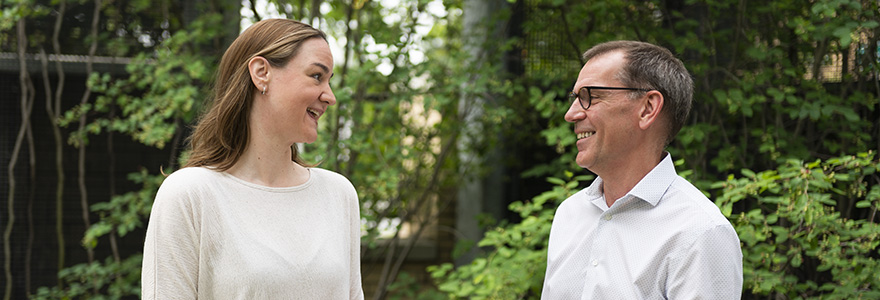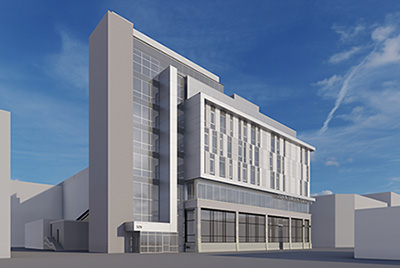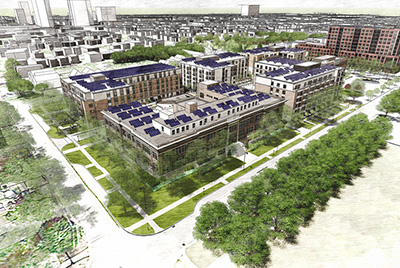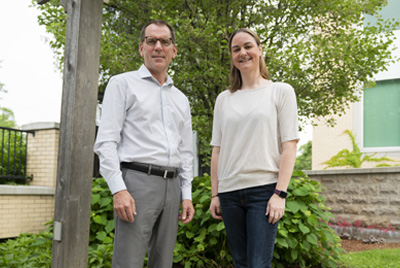Advocacy in action

Embracing their advocacy role, two physician groups are supporting the community’s most vulnerable
By Jennifer Párraga, BA’93
When emergency physician Dr. Bill McCauley, MD’87, presented a funding proposal for a local, affordable housing project to his colleagues in the London Emergency Medicine Association (LEMA), he had two goals: build consensus with the group to take action, and publicly advocate for the project while inspiring others.
He accomplished both.
Thanks to the compassion and generosity of LEMA, the Vision SoHo Alliance, a partnership between six nonprofit housing developers, received a $100,000 donation.
“While the past two years have been particularly challenging for physicians, we know others in our community have suffered more than us. With this donation we wanted to show leadership and demonstrate that, despite our own challenges, there is more that we can do.”
— Dr. Bill McCauley
McCauley says that the project offered the group an opportunity to support the people they serve beyond care.
“While the past two years have been particularly challenging for physicians, we know others in our community have suffered more than us,” said McCauley, Assistant Dean, Professional Affairs. “With this donation we wanted to show leadership and demonstrate that, despite our own challenges, there is more that we can do.”
Weeks later, while the story of the LEMA donation was still showing up on news and social media feeds, another physician group also took action.
The local branch of the Canadian Women Physicians group publicly announced a donation to Joan’s Place, a Youth Opportunities Unlimited initiative that offers a safe and affordable home for youth, young mothers and mothers-to-be who are experiencing or at risk of homelessness.
“When LEMA made the donation, we began talking about it on our social media group,” said resident alumna Dr. Allison Meiwald, Associate Professor, Medicine, and emergency physician. “One of our members, Dr. Jessica McPherson, asked the group what we could do to support our community and the causes that we believe in – something that would affect all our practices and that could inspire others.”
Meiwald said that as women physicians, Joan’s Place really resonated with members. It also was important that their donation would be matched.
“It felt good to do something proactively instead of reactively. Often, we are at the end of helping people who are managing challenging situations. It felt good to contribute to something that offers support at the beginning of a person’s journey,” she said.
For their parts, Indwell, one of the partners involved with the Vision SoHo Alliance, and Youth Opportunities Unlimited couldn’t be more grateful for the support from the two groups.
 Architectural rendering of Youth Opportunities Unlimited Joan’s Place.
Architectural rendering of Youth Opportunities Unlimited Joan’s Place.
“The donation from LEMA sent a valuable message to the community about the importance of the project, and it positions us to access additional funding from all three levels of government,” said Julie Ryan, Community Engagement Coordinator for Indwell. “It has also inspired a number of groups to come forward to make their own gifts.”
“What an inspiring display of community it was to witness the Women in Medicine group rally to fundraise for vulnerable young women and their families,” said Jamie Lee Arseneau, Community Engagement Manager for Youth Opportunities Unlimited. “Not only will Joan’s Place allow young Londoners to exit homelessness and begin to create a stable home for their families, but it will allow access to a wraparound model of care.”
McCauley and Meiwald are proud of the impact the donations have made. Importantly, they welcome the opportunities these projects provided them to embrace a component of their role as health advocates.
“This is a crucial time for us to step up and take action and to support the human race to be healthy.” — Dr. Allison Meiwald
A role within the CanMEDS framework, experts agree that health advocate is not as easy to conceptualize as the six other roles.
Dr. Chris Watling, Acting Vice Dean, Education Scholarship and Strategy and Director, Centre for Education Research & Innovation (CERI), says that the role is less defined, under taught and invites opportunity for research.
 Aerial view of the Vision SoHo project.
Aerial view of the Vision SoHo project.
“What we do know is that role modelling makes a significant difference in advocacy,” he said. “Public acts of advocacy that are led by physicians have strong and useful effects on medical students and others.”
Kori LaDonna, PhD, has focused a part of her research in this area. She completed her postdoctoral fellowship at CERI and is now an Assistant Professor at the University of Ottawa.
She says that current research questions are focused on systems-level advocacy and looking at whether the type of acts undertaken by the local physician groups are more about going above and beyond – a calling or a moral social justice approach – which is quite different than being a good doctor and advocating at the patient level.
“One of the biggest questions people are asking is the difference between professionalism and advocacy,” she said. “Regardless, we know that the world is hungry for advocates.”
 Drs. Bill McCauley and Allison Meiwald
Drs. Bill McCauley and Allison Meiwald
“But advocacy is not one thing,” she added. “It can manifest in a hallway chat with a colleague to support a patient in securing additional services to a march on Parliament Hill, or through the type of transformational advocacy that the two physician groups in London recently undertook through their donations. Individuals have the power within them to do something.”
Meiwald uses this philosophy of advocacy with her learners, who she says are already experiencing a great deal of stress and may not have the ability to take on larger roles.
“When we are working together in the ER, I have our learners focus on the small things that can make a difference and have them focus on the patients’ most immediate and basic needs,” she said. “I remind them about the importance of respect, equity and kindness and how these are important tenets in advocating for population health.”
McCauley and Meiwald agree that the past two years have increased the need for physicians to serve as advocates.
“This is a crucial time for us to step up and take action and to support the human race to be healthy,” Meiwald said.








